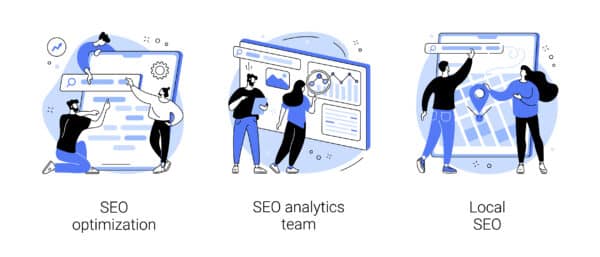
The Basics of Search Engine Optimization (Beginner Friendly)
If you’ve ever wondered how to get your website to show up in search engine results, you’re about to embark on an exciting journey. This article is all about the basics of Search Engine Optimization, or SEO as it’s commonly known.
SEO is a crucial tool in the digital world, helping your website become more visible to those who are searching for what you offer. Whether you’re a business owner, a blogger, or just a curious learner, understanding SEO can open up new opportunities for you.
What is SEO?
If you’re just stepping into the digital world, you might be asking, “What exactly is SEO?” Let me break it down for you. SEO, or Search Engine Optimization, is a collection of strategies and techniques that aim to boost a website’s visibility in search engine results. The ultimate goal? To draw more organic, or non-paid, traffic to your website.
At the core of SEO is an understanding of how search engines operate. When you enter a query into a search engine like Google, it uses complex algorithms to find and display the most relevant results. These algorithms consider a multitude of factors, such as the relevance and quality of content, the number and quality of links to a website, and the user experience provided by a website.
SEO is all about making your website more appealing to these algorithms. It involves optimizing various elements of your website, from the words on your pages to the way other sites link to you on the web. It’s about ensuring your website is structured in a way that search engines understand.
But SEO isn’t just about making search engines happy. It’s also about making your website better for people. After all, search engines are designed to serve people. If your website is easy to navigate, filled with high-quality content, and provides a great user experience, it’s more likely to attract and retain visitors.
Ultimately, SEO is about understanding the language of search engines. It’s about speaking that language to communicate to search engines that your website is a valuable resource for users. It’s about helping search engines connect users with your website when they’re searching for the products or services you offer.
In essence, SEO is a bridge between your website and search engines. It’s a way of telling search engines, “Hey, my website has what users are looking for!” And when done right, SEO can help your website rank higher in search results, attract more traffic, and achieve your business goals.
One of the first things you’ll learn in SEO is the importance of keywords. Keywords are the words and phrases that people type into search engines when they’re looking for something. They’re the bridge between what people are searching for and the content you provide on your website.
When you use the right keywords in your content, you’re essentially telling search engines, “My website has the information that users are searching for.” This can significantly improve your website’s visibility in search engine results and attract more relevant traffic to your site.
But how do you find the right keywords? This is where keyword research comes in. Keyword research is the process of finding and analyzing the keywords that people use when they’re searching for the products, services, or information that you offer. It’s about understanding what your potential customers are searching for and how you can reach them through search engines.
There are various tools and techniques you can use for keyword research. For instance, you can use keyword research tools like Google Keyword Planner or SEMrush to find popular keywords in your industry. You can also analyze your competitors’ websites to see what keywords they’re targeting.
Once you’ve identified your keywords, the next step is to incorporate them into your website. This includes using them in your content, your meta tags, your URLs, and your internal links. But remember, while keywords are important, they’re not the be-all and end-all of SEO. It’s not about stuffing your content with keywords, but about creating valuable, relevant content that meets the needs of your audience.
On-Page SEO
On-Page SEO is a crucial component of any SEO strategy. It involves optimizing the elements that are within your website to improve its visibility and ranking in search engine results. Let’s delve into what this entails.
The first aspect of On-Page SEO is content. The content on your website needs to be high-quality, relevant, and valuable to your audience. It should answer their questions, solve their problems, and provide the information they’re looking for. But it’s not just about the quality of your content, it’s also about how you present it. This includes using relevant keywords in your content, creating engaging headlines, and using images and videos to enhance your content.
Meta tags are another important element of On-Page SEO. These are snippets of text that describe a page’s content and are only visible to search engines. They include the title tag, which is the title of your page, and the meta description, which is a brief summary of your page. By optimizing your meta tags with relevant keywords, you can help search engines understand what your page is about and attract more relevant traffic to your site.
Internal links are also a key part of On-Page SEO. These are links that go from one page on your site to another. Internal links help search engines understand the structure of your website and can improve your site’s ranking for certain keywords.
In essence, On-Page SEO is all about making your website more user-friendly and search engine-friendly. It’s about creating high-quality, relevant content, optimizing your meta tags, and using internal links to improve your site’s structure. By focusing on these elements, you can enhance your website’s visibility, attract more organic traffic, and provide a better user experience for your visitors.
Off-Page SEO
While On-Page SEO focuses on optimizing the elements within your website, Off-Page SEO is all about improving your website’s reputation and authority in the digital world. It involves strategies and techniques that occur outside of your website. Let’s explore this further.
One of the most important aspects of Off-Page SEO is backlinks. Backlinks are links from other websites that point to your website. They’re like votes of confidence in your site. When other reputable websites link to your site, it signals to search engines that your content is credible and authoritative, which can significantly improve your ranking.
But how do you get backlinks? There are several strategies you can use. One of the most effective ways is to create high-quality, valuable content that others want to link to. You can also reach out to other websites or blogs in your industry and ask them to link to your content. Guest blogging, where you write a post for another website and include a link back to your site, is another popular strategy.
Social signals, such as likes, shares, and comments on social media, are another aspect of Off-Page SEO. While it’s still a topic of debate among SEO experts, there’s evidence to suggest that social signals can impact your SEO. By promoting your content on social media and engaging with your audience, you can increase your social signals and potentially boost your SEO.
Technical SEO
Technical SEO is a critical component of a comprehensive SEO strategy. It involves optimizing the technical aspects of your website to help search engines crawl and index your site more effectively. Let’s delve into this a bit more.
One of the most important aspects of Technical SEO is site speed. Search engines favor websites that load quickly. A slow-loading website can lead to a poor user experience, causing visitors to leave your site and potentially hurting your ranking in search engine results. Therefore, it’s crucial to optimize your site speed by compressing images, minifying code, and using a reliable hosting provider.
Mobile-friendliness is another key factor in Technical SEO. With more and more people using their mobile devices to browse the web, search engines are placing a greater emphasis on mobile-friendliness. This means your website needs to be responsive, meaning it should automatically adjust to fit the screen size of the device it’s being viewed on. A mobile-friendly website not only provides a better user experience but can also improve your ranking in search engine results.
Site architecture is also a crucial part of Technical SEO. A well-structured website makes it easier for search engines to crawl your site and for users to navigate your site. This includes using a logical URL structure, creating a sitemap, and using internal links to connect your pages.

Local SEO
Local SEO is a facet of SEO that focuses on optimizing a website to be found in local search results. This is particularly important for small businesses and those with physical locations. Let’s explore this in more detail.
Local search queries include those with geographical qualifiers, such as “near me” or “in [city name],” as well as searches for specific services that Google interprets as having local intent, such as “coffee shop” or “car repair.” When users make these types of searches, search engines provide results that are relevant to the specific geographical area.
Optimizing for local SEO involves several strategies. One of the most important is claiming and optimizing your Google My Business listing. This free listing from Google allows you to provide information about your business, such as your address, hours of operation, and photos. When optimized correctly, your Google My Business listing can appear in local search results and Google Maps, making it easier for potential customers in your area to find and contact you.
Online reviews are another crucial aspect of local SEO. Many people look at reviews when deciding which business to choose, and a business with positive reviews can rank higher in local search results. Encouraging satisfied customers to leave reviews, and responding to those reviews, can improve your online reputation and boost your local SEO.
Citations, which are online mentions of your business, also play a role in local SEO. Ensuring your business information is consistent across various online directories can improve your visibility in local search results.
Local SEO is a vital strategy for businesses looking to attract customers in their local area. By optimizing your Google My Business listing, encouraging online reviews, and maintaining consistent citations, you can improve your visibility in local search results and attract more customers to your business. It’s about making sure your business is found by the people in your area who are looking for the products or services you offer.

